Report on Strategic and Operational Issues in Conference Management
VerifiedAdded on 2020/12/18
|8
|2322
|93
Report
AI Summary
This report provides a comprehensive analysis of the conference and banqueting industry in the UK. It begins by discussing the size and scope of the industry, highlighting its significant contribution to the UK economy and its division into conference and banqueting sectors. The report then delves into factors that have influenced the industry's development, including accommodation services, catering, conference room availability, geographic location, economic conditions, socio-cultural considerations, and technological advancements. Key strategic and operational issues are critically assessed, such as pricing and packaging, discounting initiatives, and space utilization, along with operational challenges like health and safety regulations, hygiene standards, and licensing laws. Finally, the report examines performance and quality review techniques used in the industry, including the Program Evaluation and Review Technique (PERT), Six Sigma, and methods for evaluating client satisfaction, venue appraisal, and profit realization. The report concludes with an overview of the industry's growth and future prospects.
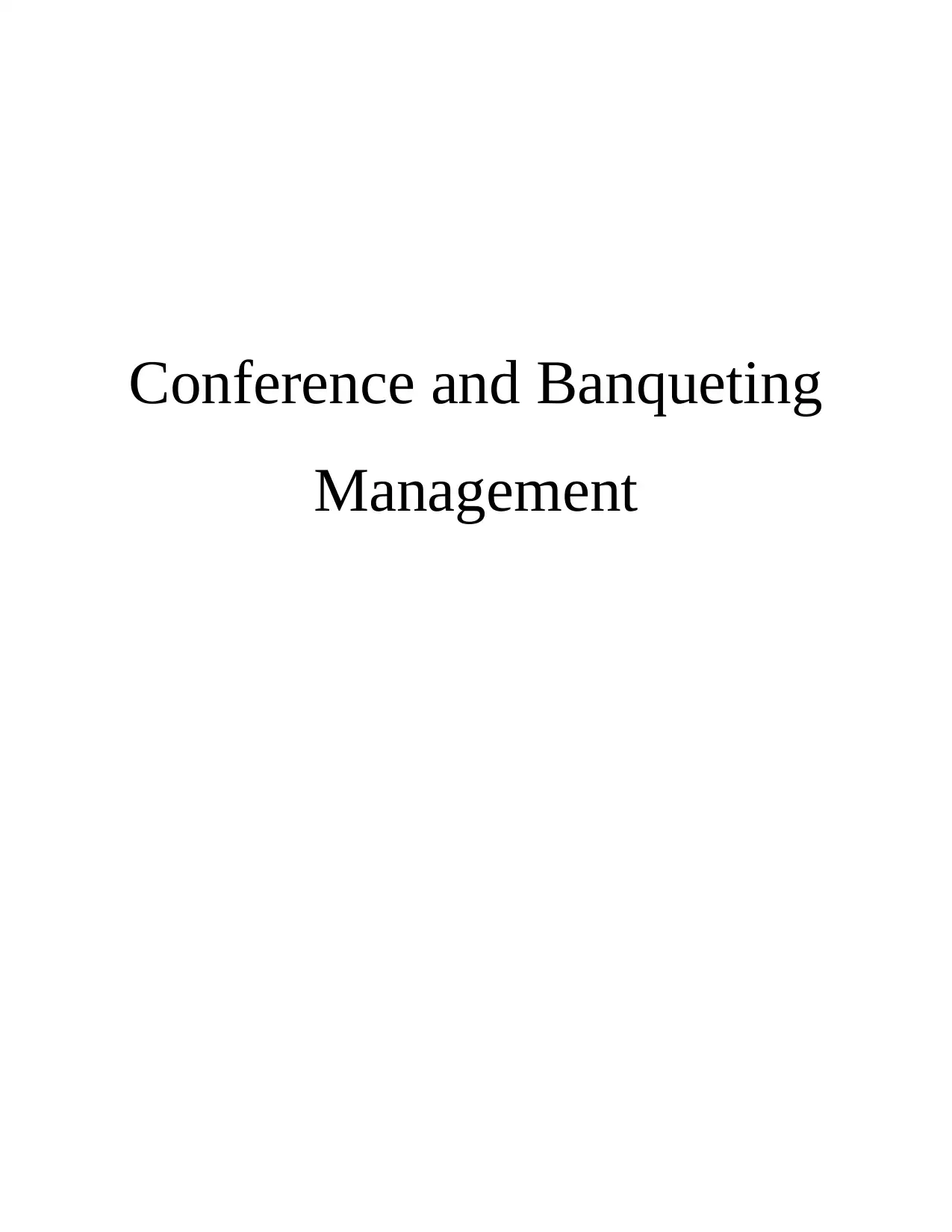
Conference and Banqueting
Management
Management
Paraphrase This Document
Need a fresh take? Get an instant paraphrase of this document with our AI Paraphraser
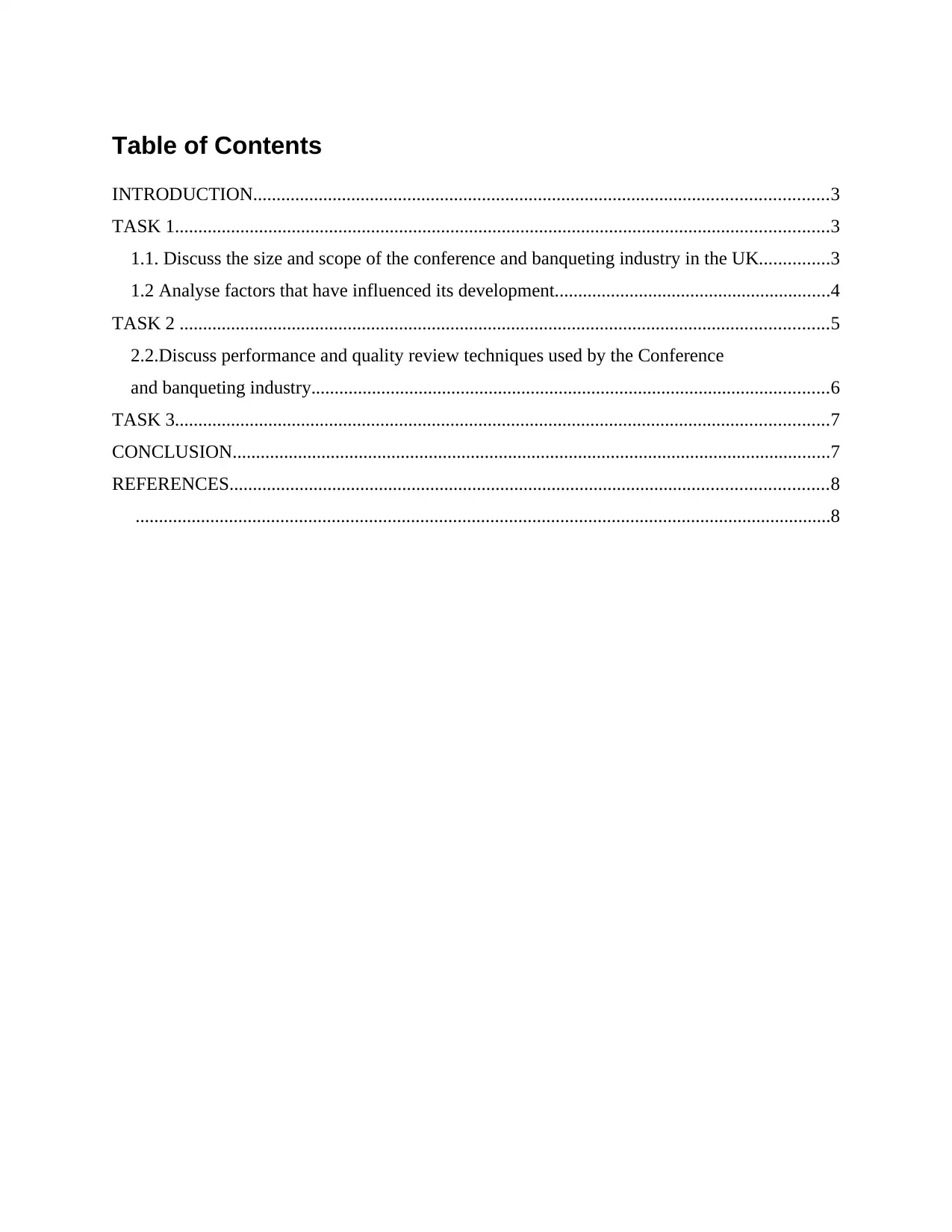
Table of Contents
INTRODUCTION...........................................................................................................................3
TASK 1............................................................................................................................................3
1.1. Discuss the size and scope of the conference and banqueting industry in the UK...............3
1.2 Analyse factors that have influenced its development...........................................................4
TASK 2 ...........................................................................................................................................5
2.2.Discuss performance and quality review techniques used by the Conference
and banqueting industry...............................................................................................................6
TASK 3............................................................................................................................................7
CONCLUSION................................................................................................................................7
REFERENCES................................................................................................................................8
.....................................................................................................................................................8
INTRODUCTION...........................................................................................................................3
TASK 1............................................................................................................................................3
1.1. Discuss the size and scope of the conference and banqueting industry in the UK...............3
1.2 Analyse factors that have influenced its development...........................................................4
TASK 2 ...........................................................................................................................................5
2.2.Discuss performance and quality review techniques used by the Conference
and banqueting industry...............................................................................................................6
TASK 3............................................................................................................................................7
CONCLUSION................................................................................................................................7
REFERENCES................................................................................................................................8
.....................................................................................................................................................8
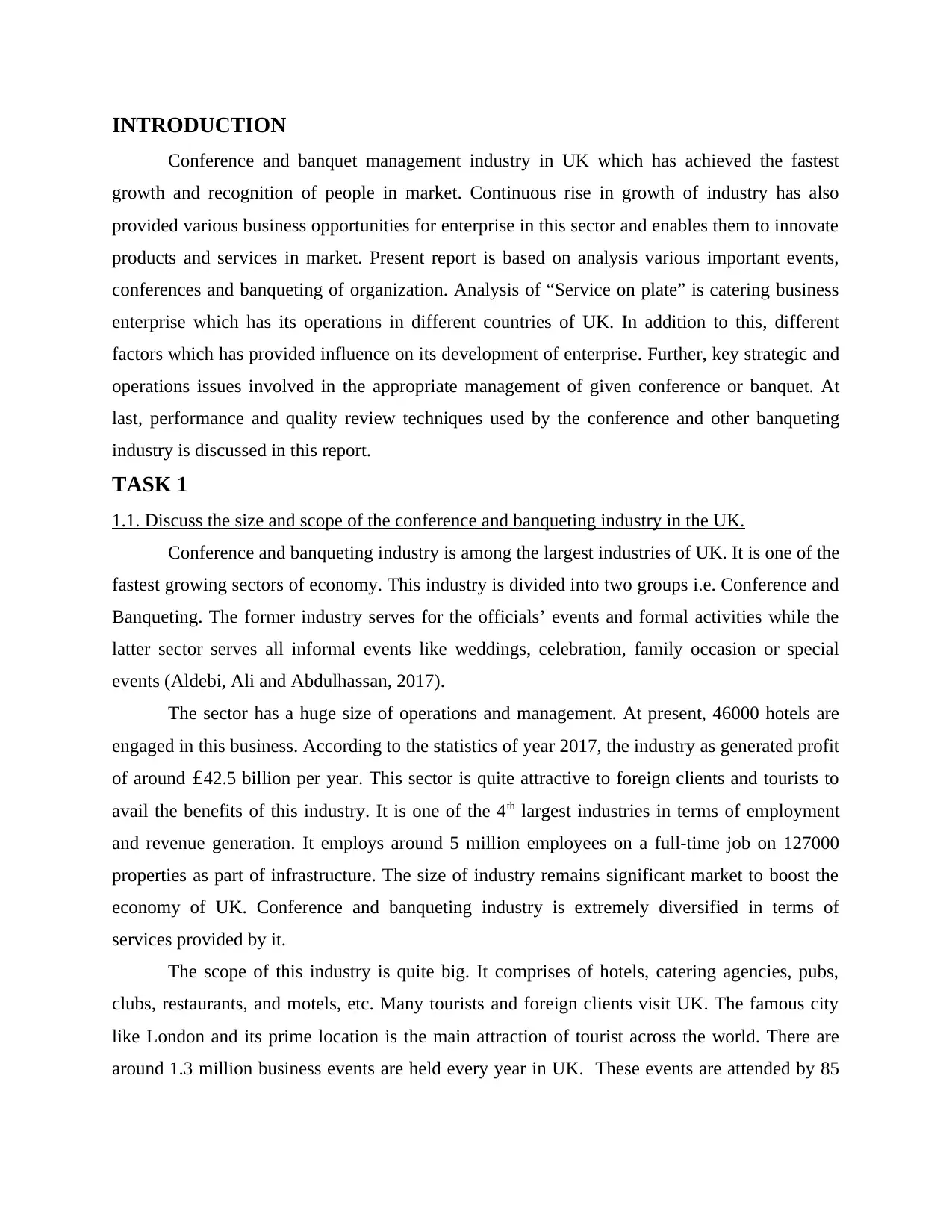
INTRODUCTION
Conference and banquet management industry in UK which has achieved the fastest
growth and recognition of people in market. Continuous rise in growth of industry has also
provided various business opportunities for enterprise in this sector and enables them to innovate
products and services in market. Present report is based on analysis various important events,
conferences and banqueting of organization. Analysis of “Service on plate” is catering business
enterprise which has its operations in different countries of UK. In addition to this, different
factors which has provided influence on its development of enterprise. Further, key strategic and
operations issues involved in the appropriate management of given conference or banquet. At
last, performance and quality review techniques used by the conference and other banqueting
industry is discussed in this report.
TASK 1
1.1. Discuss the size and scope of the conference and banqueting industry in the UK.
Conference and banqueting industry is among the largest industries of UK. It is one of the
fastest growing sectors of economy. This industry is divided into two groups i.e. Conference and
Banqueting. The former industry serves for the officials’ events and formal activities while the
latter sector serves all informal events like weddings, celebration, family occasion or special
events (Aldebi, Ali and Abdulhassan, 2017).
The sector has a huge size of operations and management. At present, 46000 hotels are
engaged in this business. According to the statistics of year 2017, the industry as generated profit
of around £42.5 billion per year. This sector is quite attractive to foreign clients and tourists to
avail the benefits of this industry. It is one of the 4th largest industries in terms of employment
and revenue generation. It employs around 5 million employees on a full-time job on 127000
properties as part of infrastructure. The size of industry remains significant market to boost the
economy of UK. Conference and banqueting industry is extremely diversified in terms of
services provided by it.
The scope of this industry is quite big. It comprises of hotels, catering agencies, pubs,
clubs, restaurants, and motels, etc. Many tourists and foreign clients visit UK. The famous city
like London and its prime location is the main attraction of tourist across the world. There are
around 1.3 million business events are held every year in UK. These events are attended by 85
Conference and banquet management industry in UK which has achieved the fastest
growth and recognition of people in market. Continuous rise in growth of industry has also
provided various business opportunities for enterprise in this sector and enables them to innovate
products and services in market. Present report is based on analysis various important events,
conferences and banqueting of organization. Analysis of “Service on plate” is catering business
enterprise which has its operations in different countries of UK. In addition to this, different
factors which has provided influence on its development of enterprise. Further, key strategic and
operations issues involved in the appropriate management of given conference or banquet. At
last, performance and quality review techniques used by the conference and other banqueting
industry is discussed in this report.
TASK 1
1.1. Discuss the size and scope of the conference and banqueting industry in the UK.
Conference and banqueting industry is among the largest industries of UK. It is one of the
fastest growing sectors of economy. This industry is divided into two groups i.e. Conference and
Banqueting. The former industry serves for the officials’ events and formal activities while the
latter sector serves all informal events like weddings, celebration, family occasion or special
events (Aldebi, Ali and Abdulhassan, 2017).
The sector has a huge size of operations and management. At present, 46000 hotels are
engaged in this business. According to the statistics of year 2017, the industry as generated profit
of around £42.5 billion per year. This sector is quite attractive to foreign clients and tourists to
avail the benefits of this industry. It is one of the 4th largest industries in terms of employment
and revenue generation. It employs around 5 million employees on a full-time job on 127000
properties as part of infrastructure. The size of industry remains significant market to boost the
economy of UK. Conference and banqueting industry is extremely diversified in terms of
services provided by it.
The scope of this industry is quite big. It comprises of hotels, catering agencies, pubs,
clubs, restaurants, and motels, etc. Many tourists and foreign clients visit UK. The famous city
like London and its prime location is the main attraction of tourist across the world. There are
around 1.3 million business events are held every year in UK. These events are attended by 85
⊘ This is a preview!⊘
Do you want full access?
Subscribe today to unlock all pages.

Trusted by 1+ million students worldwide
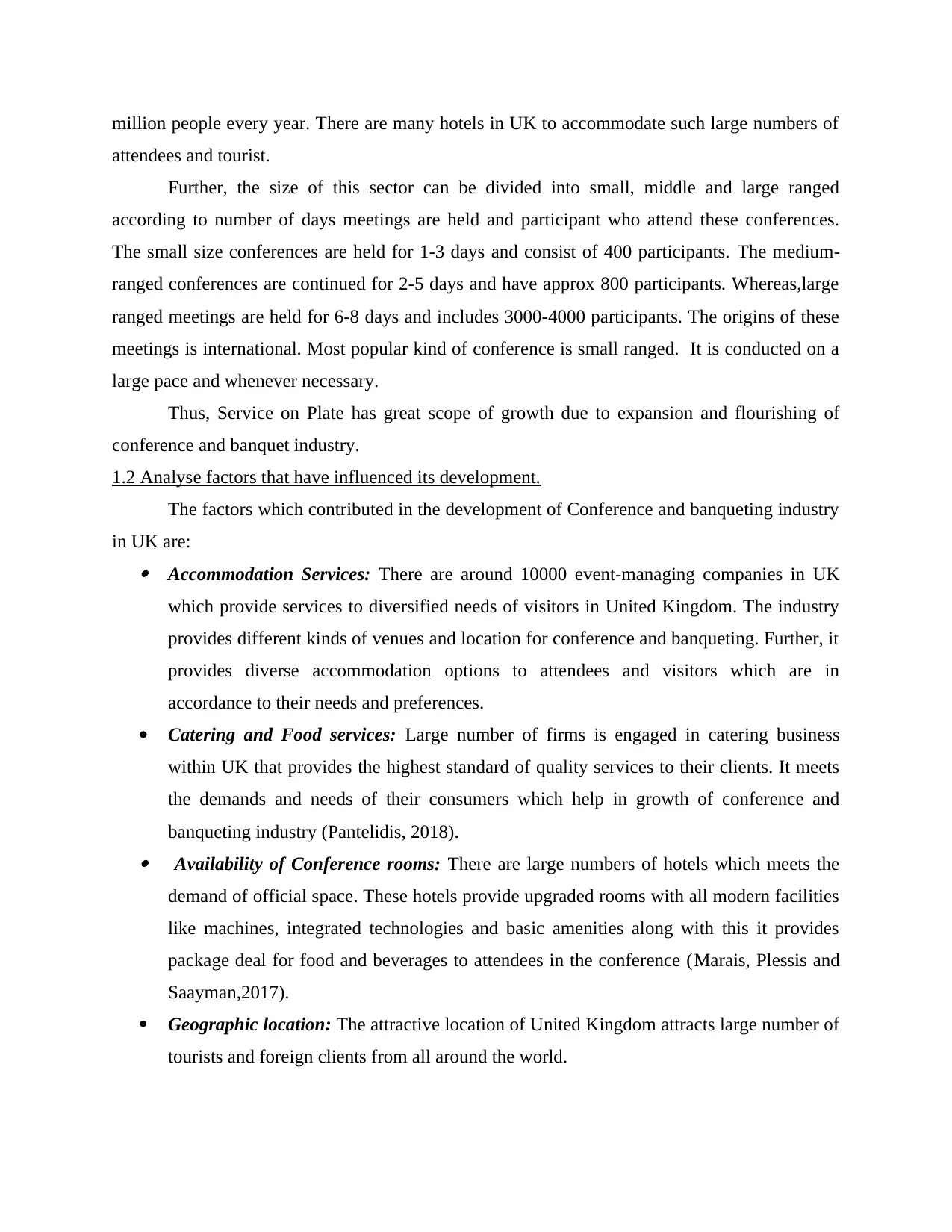
million people every year. There are many hotels in UK to accommodate such large numbers of
attendees and tourist.
Further, the size of this sector can be divided into small, middle and large ranged
according to number of days meetings are held and participant who attend these conferences.
The small size conferences are held for 1-3 days and consist of 400 participants. The medium-
ranged conferences are continued for 2-5 days and have approx 800 participants. Whereas,large
ranged meetings are held for 6-8 days and includes 3000-4000 participants. The origins of these
meetings is international. Most popular kind of conference is small ranged. It is conducted on a
large pace and whenever necessary.
Thus, Service on Plate has great scope of growth due to expansion and flourishing of
conference and banquet industry.
1.2 Analyse factors that have influenced its development.
The factors which contributed in the development of Conference and banqueting industry
in UK are: Accommodation Services: There are around 10000 event-managing companies in UK
which provide services to diversified needs of visitors in United Kingdom. The industry
provides different kinds of venues and location for conference and banqueting. Further, it
provides diverse accommodation options to attendees and visitors which are in
accordance to their needs and preferences.
Catering and Food services: Large number of firms is engaged in catering business
within UK that provides the highest standard of quality services to their clients. It meets
the demands and needs of their consumers which help in growth of conference and
banqueting industry (Pantelidis, 2018). Availability of Conference rooms: There are large numbers of hotels which meets the
demand of official space. These hotels provide upgraded rooms with all modern facilities
like machines, integrated technologies and basic amenities along with this it provides
package deal for food and beverages to attendees in the conference (Marais, Plessis and
Saayman,2017).
Geographic location: The attractive location of United Kingdom attracts large number of
tourists and foreign clients from all around the world.
attendees and tourist.
Further, the size of this sector can be divided into small, middle and large ranged
according to number of days meetings are held and participant who attend these conferences.
The small size conferences are held for 1-3 days and consist of 400 participants. The medium-
ranged conferences are continued for 2-5 days and have approx 800 participants. Whereas,large
ranged meetings are held for 6-8 days and includes 3000-4000 participants. The origins of these
meetings is international. Most popular kind of conference is small ranged. It is conducted on a
large pace and whenever necessary.
Thus, Service on Plate has great scope of growth due to expansion and flourishing of
conference and banquet industry.
1.2 Analyse factors that have influenced its development.
The factors which contributed in the development of Conference and banqueting industry
in UK are: Accommodation Services: There are around 10000 event-managing companies in UK
which provide services to diversified needs of visitors in United Kingdom. The industry
provides different kinds of venues and location for conference and banqueting. Further, it
provides diverse accommodation options to attendees and visitors which are in
accordance to their needs and preferences.
Catering and Food services: Large number of firms is engaged in catering business
within UK that provides the highest standard of quality services to their clients. It meets
the demands and needs of their consumers which help in growth of conference and
banqueting industry (Pantelidis, 2018). Availability of Conference rooms: There are large numbers of hotels which meets the
demand of official space. These hotels provide upgraded rooms with all modern facilities
like machines, integrated technologies and basic amenities along with this it provides
package deal for food and beverages to attendees in the conference (Marais, Plessis and
Saayman,2017).
Geographic location: The attractive location of United Kingdom attracts large number of
tourists and foreign clients from all around the world.
Paraphrase This Document
Need a fresh take? Get an instant paraphrase of this document with our AI Paraphraser
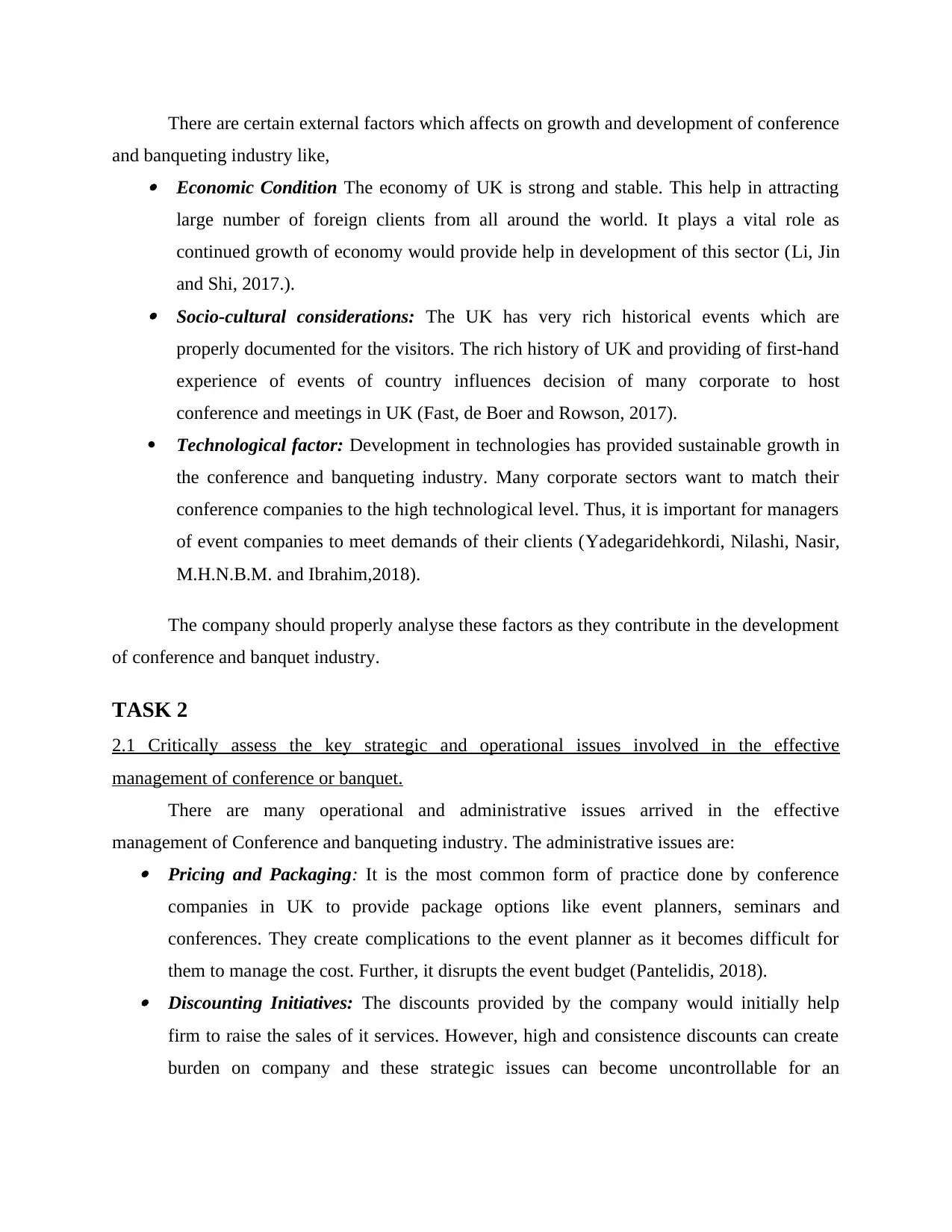
There are certain external factors which affects on growth and development of conference
and banqueting industry like, Economic Condition The economy of UK is strong and stable. This help in attracting
large number of foreign clients from all around the world. It plays a vital role as
continued growth of economy would provide help in development of this sector (Li, Jin
and Shi, 2017.). Socio-cultural considerations: The UK has very rich historical events which are
properly documented for the visitors. The rich history of UK and providing of first-hand
experience of events of country influences decision of many corporate to host
conference and meetings in UK (Fast, de Boer and Rowson, 2017).
Technological factor: Development in technologies has provided sustainable growth in
the conference and banqueting industry. Many corporate sectors want to match their
conference companies to the high technological level. Thus, it is important for managers
of event companies to meet demands of their clients (Yadegaridehkordi, Nilashi, Nasir,
M.H.N.B.M. and Ibrahim,2018).
The company should properly analyse these factors as they contribute in the development
of conference and banquet industry.
TASK 2
2.1 Critically assess the key strategic and operational issues involved in the effective
management of conference or banquet.
There are many operational and administrative issues arrived in the effective
management of Conference and banqueting industry. The administrative issues are: Pricing and Packaging: It is the most common form of practice done by conference
companies in UK to provide package options like event planners, seminars and
conferences. They create complications to the event planner as it becomes difficult for
them to manage the cost. Further, it disrupts the event budget (Pantelidis, 2018). Discounting Initiatives: The discounts provided by the company would initially help
firm to raise the sales of it services. However, high and consistence discounts can create
burden on company and these strategic issues can become uncontrollable for an
and banqueting industry like, Economic Condition The economy of UK is strong and stable. This help in attracting
large number of foreign clients from all around the world. It plays a vital role as
continued growth of economy would provide help in development of this sector (Li, Jin
and Shi, 2017.). Socio-cultural considerations: The UK has very rich historical events which are
properly documented for the visitors. The rich history of UK and providing of first-hand
experience of events of country influences decision of many corporate to host
conference and meetings in UK (Fast, de Boer and Rowson, 2017).
Technological factor: Development in technologies has provided sustainable growth in
the conference and banqueting industry. Many corporate sectors want to match their
conference companies to the high technological level. Thus, it is important for managers
of event companies to meet demands of their clients (Yadegaridehkordi, Nilashi, Nasir,
M.H.N.B.M. and Ibrahim,2018).
The company should properly analyse these factors as they contribute in the development
of conference and banquet industry.
TASK 2
2.1 Critically assess the key strategic and operational issues involved in the effective
management of conference or banquet.
There are many operational and administrative issues arrived in the effective
management of Conference and banqueting industry. The administrative issues are: Pricing and Packaging: It is the most common form of practice done by conference
companies in UK to provide package options like event planners, seminars and
conferences. They create complications to the event planner as it becomes difficult for
them to manage the cost. Further, it disrupts the event budget (Pantelidis, 2018). Discounting Initiatives: The discounts provided by the company would initially help
firm to raise the sales of it services. However, high and consistence discounts can create
burden on company and these strategic issues can become uncontrollable for an
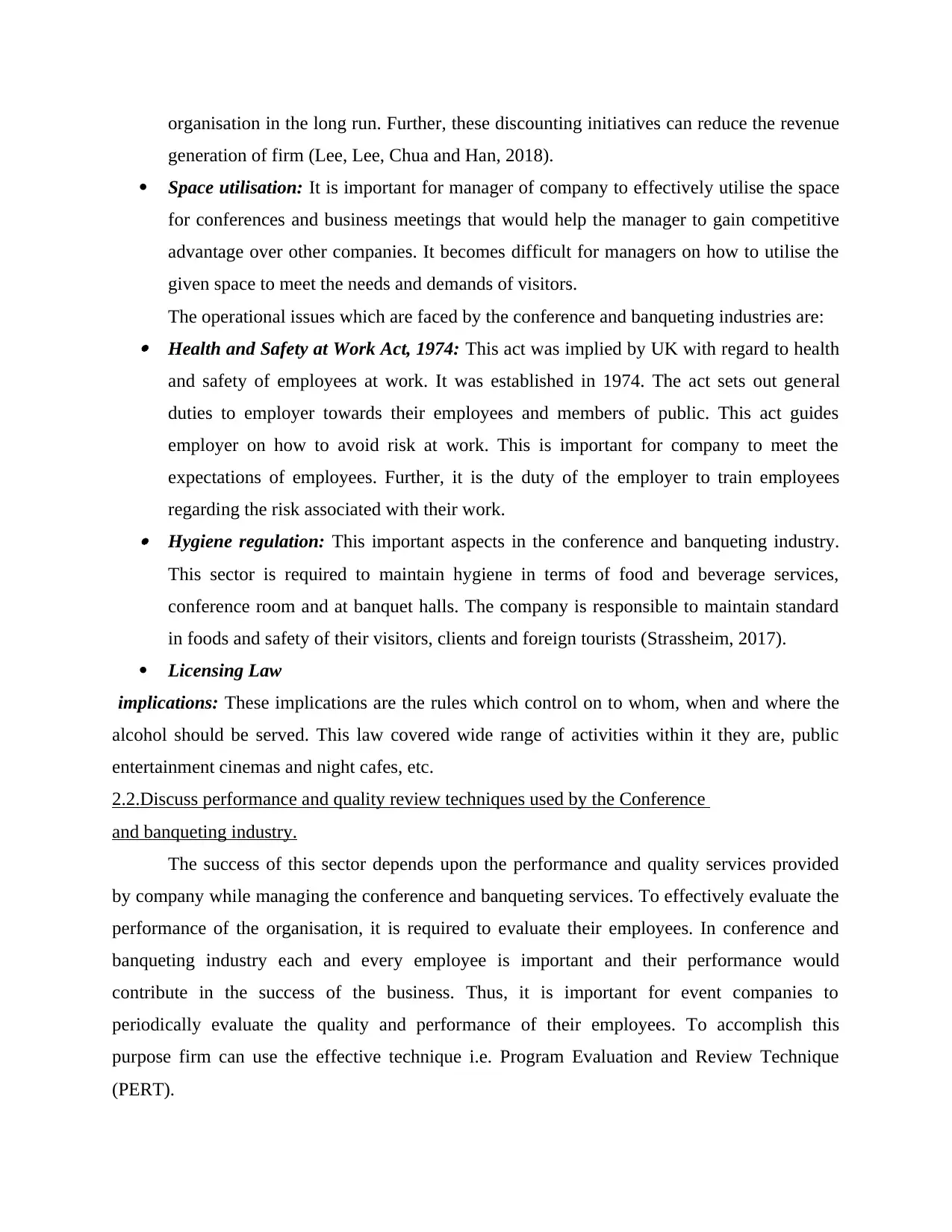
organisation in the long run. Further, these discounting initiatives can reduce the revenue
generation of firm (Lee, Lee, Chua and Han, 2018).
Space utilisation: It is important for manager of company to effectively utilise the space
for conferences and business meetings that would help the manager to gain competitive
advantage over other companies. It becomes difficult for managers on how to utilise the
given space to meet the needs and demands of visitors.
The operational issues which are faced by the conference and banqueting industries are: Health and Safety at Work Act, 1974: This act was implied by UK with regard to health
and safety of employees at work. It was established in 1974. The act sets out general
duties to employer towards their employees and members of public. This act guides
employer on how to avoid risk at work. This is important for company to meet the
expectations of employees. Further, it is the duty of the employer to train employees
regarding the risk associated with their work. Hygiene regulation: This important aspects in the conference and banqueting industry.
This sector is required to maintain hygiene in terms of food and beverage services,
conference room and at banquet halls. The company is responsible to maintain standard
in foods and safety of their visitors, clients and foreign tourists (Strassheim, 2017).
Licensing Law
implications: These implications are the rules which control on to whom, when and where the
alcohol should be served. This law covered wide range of activities within it they are, public
entertainment cinemas and night cafes, etc.
2.2.Discuss performance and quality review techniques used by the Conference
and banqueting industry.
The success of this sector depends upon the performance and quality services provided
by company while managing the conference and banqueting services. To effectively evaluate the
performance of the organisation, it is required to evaluate their employees. In conference and
banqueting industry each and every employee is important and their performance would
contribute in the success of the business. Thus, it is important for event companies to
periodically evaluate the quality and performance of their employees. To accomplish this
purpose firm can use the effective technique i.e. Program Evaluation and Review Technique
(PERT).
generation of firm (Lee, Lee, Chua and Han, 2018).
Space utilisation: It is important for manager of company to effectively utilise the space
for conferences and business meetings that would help the manager to gain competitive
advantage over other companies. It becomes difficult for managers on how to utilise the
given space to meet the needs and demands of visitors.
The operational issues which are faced by the conference and banqueting industries are: Health and Safety at Work Act, 1974: This act was implied by UK with regard to health
and safety of employees at work. It was established in 1974. The act sets out general
duties to employer towards their employees and members of public. This act guides
employer on how to avoid risk at work. This is important for company to meet the
expectations of employees. Further, it is the duty of the employer to train employees
regarding the risk associated with their work. Hygiene regulation: This important aspects in the conference and banqueting industry.
This sector is required to maintain hygiene in terms of food and beverage services,
conference room and at banquet halls. The company is responsible to maintain standard
in foods and safety of their visitors, clients and foreign tourists (Strassheim, 2017).
Licensing Law
implications: These implications are the rules which control on to whom, when and where the
alcohol should be served. This law covered wide range of activities within it they are, public
entertainment cinemas and night cafes, etc.
2.2.Discuss performance and quality review techniques used by the Conference
and banqueting industry.
The success of this sector depends upon the performance and quality services provided
by company while managing the conference and banqueting services. To effectively evaluate the
performance of the organisation, it is required to evaluate their employees. In conference and
banqueting industry each and every employee is important and their performance would
contribute in the success of the business. Thus, it is important for event companies to
periodically evaluate the quality and performance of their employees. To accomplish this
purpose firm can use the effective technique i.e. Program Evaluation and Review Technique
(PERT).
⊘ This is a preview!⊘
Do you want full access?
Subscribe today to unlock all pages.

Trusted by 1+ million students worldwide
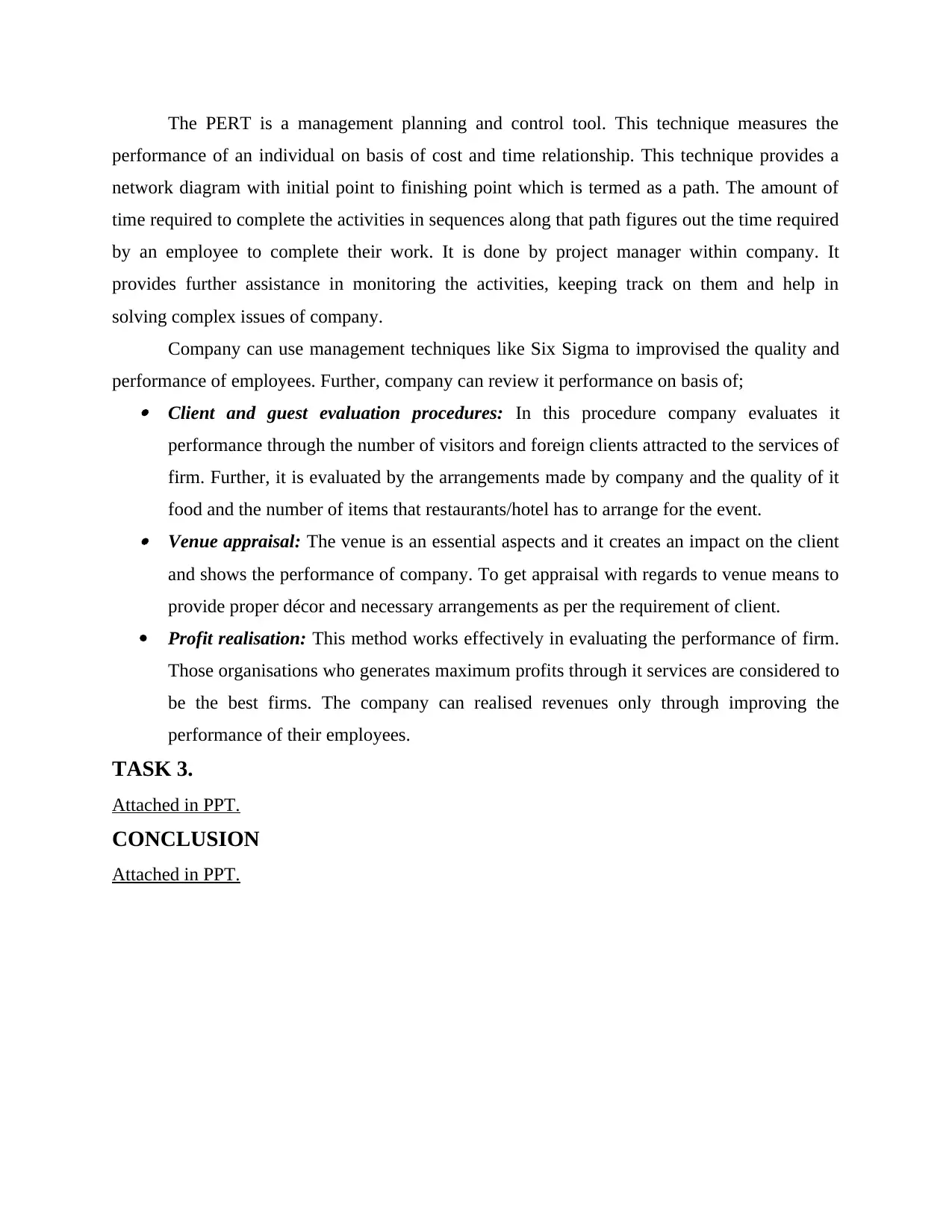
The PERT is a management planning and control tool. This technique measures the
performance of an individual on basis of cost and time relationship. This technique provides a
network diagram with initial point to finishing point which is termed as a path. The amount of
time required to complete the activities in sequences along that path figures out the time required
by an employee to complete their work. It is done by project manager within company. It
provides further assistance in monitoring the activities, keeping track on them and help in
solving complex issues of company.
Company can use management techniques like Six Sigma to improvised the quality and
performance of employees. Further, company can review it performance on basis of; Client and guest evaluation procedures: In this procedure company evaluates it
performance through the number of visitors and foreign clients attracted to the services of
firm. Further, it is evaluated by the arrangements made by company and the quality of it
food and the number of items that restaurants/hotel has to arrange for the event. Venue appraisal: The venue is an essential aspects and it creates an impact on the client
and shows the performance of company. To get appraisal with regards to venue means to
provide proper décor and necessary arrangements as per the requirement of client.
Profit realisation: This method works effectively in evaluating the performance of firm.
Those organisations who generates maximum profits through it services are considered to
be the best firms. The company can realised revenues only through improving the
performance of their employees.
TASK 3.
Attached in PPT.
CONCLUSION
Attached in PPT.
performance of an individual on basis of cost and time relationship. This technique provides a
network diagram with initial point to finishing point which is termed as a path. The amount of
time required to complete the activities in sequences along that path figures out the time required
by an employee to complete their work. It is done by project manager within company. It
provides further assistance in monitoring the activities, keeping track on them and help in
solving complex issues of company.
Company can use management techniques like Six Sigma to improvised the quality and
performance of employees. Further, company can review it performance on basis of; Client and guest evaluation procedures: In this procedure company evaluates it
performance through the number of visitors and foreign clients attracted to the services of
firm. Further, it is evaluated by the arrangements made by company and the quality of it
food and the number of items that restaurants/hotel has to arrange for the event. Venue appraisal: The venue is an essential aspects and it creates an impact on the client
and shows the performance of company. To get appraisal with regards to venue means to
provide proper décor and necessary arrangements as per the requirement of client.
Profit realisation: This method works effectively in evaluating the performance of firm.
Those organisations who generates maximum profits through it services are considered to
be the best firms. The company can realised revenues only through improving the
performance of their employees.
TASK 3.
Attached in PPT.
CONCLUSION
Attached in PPT.
Paraphrase This Document
Need a fresh take? Get an instant paraphrase of this document with our AI Paraphraser
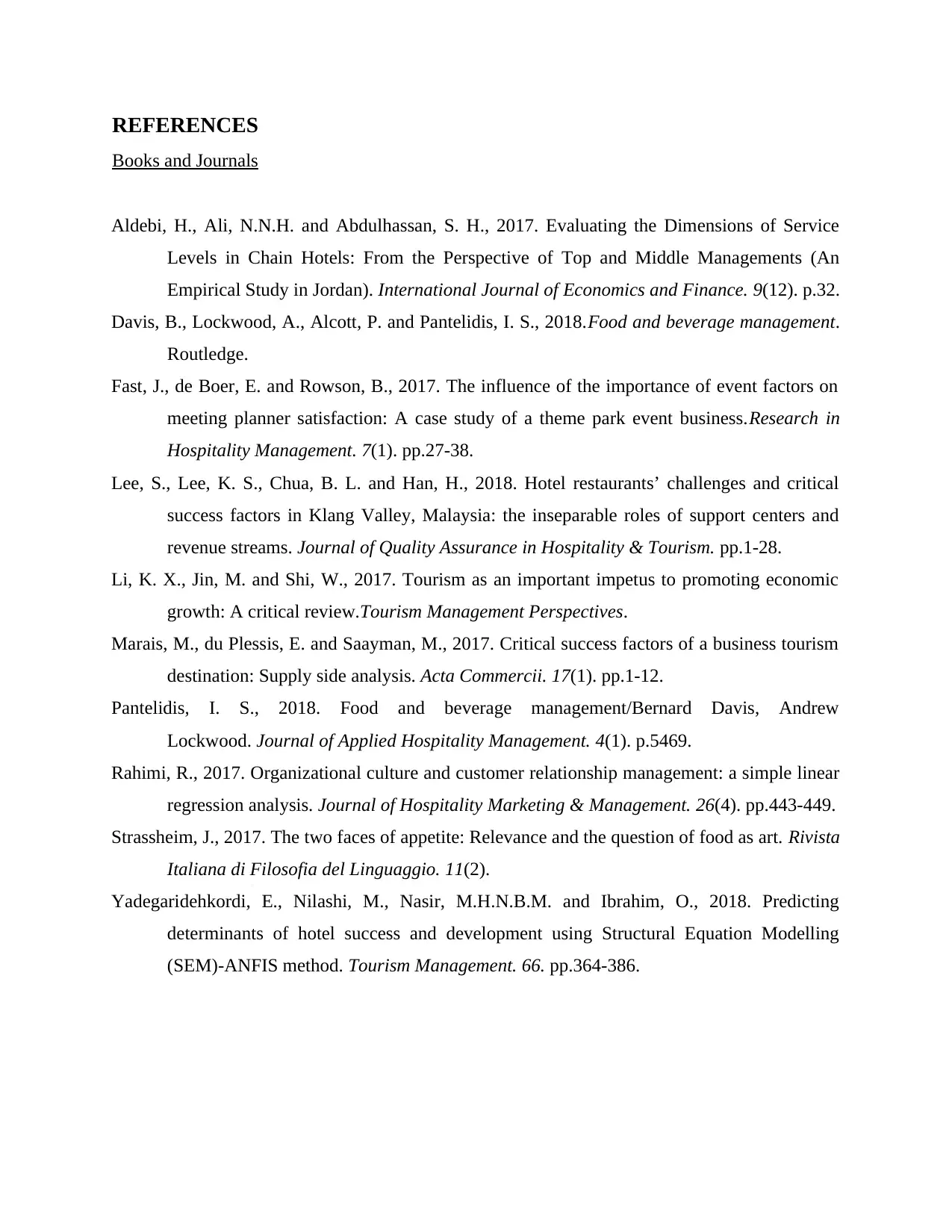
REFERENCES
Books and Journals
Aldebi, H., Ali, N.N.H. and Abdulhassan, S. H., 2017. Evaluating the Dimensions of Service
Levels in Chain Hotels: From the Perspective of Top and Middle Managements (An
Empirical Study in Jordan). International Journal of Economics and Finance. 9(12). p.32.
Davis, B., Lockwood, A., Alcott, P. and Pantelidis, I. S., 2018.Food and beverage management.
Routledge.
Fast, J., de Boer, E. and Rowson, B., 2017. The influence of the importance of event factors on
meeting planner satisfaction: A case study of a theme park event business.Research in
Hospitality Management. 7(1). pp.27-38.
Lee, S., Lee, K. S., Chua, B. L. and Han, H., 2018. Hotel restaurants’ challenges and critical
success factors in Klang Valley, Malaysia: the inseparable roles of support centers and
revenue streams. Journal of Quality Assurance in Hospitality & Tourism. pp.1-28.
Li, K. X., Jin, M. and Shi, W., 2017. Tourism as an important impetus to promoting economic
growth: A critical review.Tourism Management Perspectives.
Marais, M., du Plessis, E. and Saayman, M., 2017. Critical success factors of a business tourism
destination: Supply side analysis. Acta Commercii. 17(1). pp.1-12.
Pantelidis, I. S., 2018. Food and beverage management/Bernard Davis, Andrew
Lockwood. Journal of Applied Hospitality Management. 4(1). p.5469.
Rahimi, R., 2017. Organizational culture and customer relationship management: a simple linear
regression analysis. Journal of Hospitality Marketing & Management. 26(4). pp.443-449.
Strassheim, J., 2017. The two faces of appetite: Relevance and the question of food as art. Rivista
Italiana di Filosofia del Linguaggio. 11(2).
Yadegaridehkordi, E., Nilashi, M., Nasir, M.H.N.B.M. and Ibrahim, O., 2018. Predicting
determinants of hotel success and development using Structural Equation Modelling
(SEM)-ANFIS method. Tourism Management. 66. pp.364-386.
Books and Journals
Aldebi, H., Ali, N.N.H. and Abdulhassan, S. H., 2017. Evaluating the Dimensions of Service
Levels in Chain Hotels: From the Perspective of Top and Middle Managements (An
Empirical Study in Jordan). International Journal of Economics and Finance. 9(12). p.32.
Davis, B., Lockwood, A., Alcott, P. and Pantelidis, I. S., 2018.Food and beverage management.
Routledge.
Fast, J., de Boer, E. and Rowson, B., 2017. The influence of the importance of event factors on
meeting planner satisfaction: A case study of a theme park event business.Research in
Hospitality Management. 7(1). pp.27-38.
Lee, S., Lee, K. S., Chua, B. L. and Han, H., 2018. Hotel restaurants’ challenges and critical
success factors in Klang Valley, Malaysia: the inseparable roles of support centers and
revenue streams. Journal of Quality Assurance in Hospitality & Tourism. pp.1-28.
Li, K. X., Jin, M. and Shi, W., 2017. Tourism as an important impetus to promoting economic
growth: A critical review.Tourism Management Perspectives.
Marais, M., du Plessis, E. and Saayman, M., 2017. Critical success factors of a business tourism
destination: Supply side analysis. Acta Commercii. 17(1). pp.1-12.
Pantelidis, I. S., 2018. Food and beverage management/Bernard Davis, Andrew
Lockwood. Journal of Applied Hospitality Management. 4(1). p.5469.
Rahimi, R., 2017. Organizational culture and customer relationship management: a simple linear
regression analysis. Journal of Hospitality Marketing & Management. 26(4). pp.443-449.
Strassheim, J., 2017. The two faces of appetite: Relevance and the question of food as art. Rivista
Italiana di Filosofia del Linguaggio. 11(2).
Yadegaridehkordi, E., Nilashi, M., Nasir, M.H.N.B.M. and Ibrahim, O., 2018. Predicting
determinants of hotel success and development using Structural Equation Modelling
(SEM)-ANFIS method. Tourism Management. 66. pp.364-386.
1 out of 8
Related Documents
Your All-in-One AI-Powered Toolkit for Academic Success.
+13062052269
info@desklib.com
Available 24*7 on WhatsApp / Email
![[object Object]](/_next/static/media/star-bottom.7253800d.svg)
Unlock your academic potential
Copyright © 2020–2026 A2Z Services. All Rights Reserved. Developed and managed by ZUCOL.





